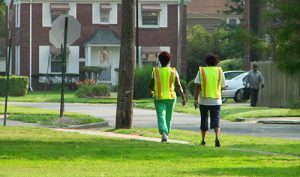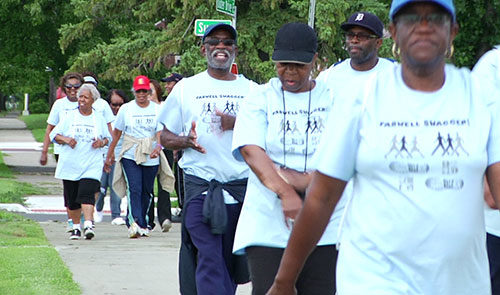U-M School of Public Health + the Healthy Environments Partnership
The Healthy Environments Partnership (HEP), established in 2000, brings together Detroit-based community organizations, including Brightmoor Community Center, Detroit Hispanic Development Corporation, Friends of Parkside, and Detroit Neighborhood Partnership East- Warren Conner Development Coalition; community members; public health agencies (Institute for Population Health); health service organizations (Henry Ford Health System); and academic institutions (University of Michigan School of Public Health).
HEP is a community-based participatory research partnership with a focus on understanding and promoting heart health in Detroit neighborhoods. It examines and develops interventions that address aspects of the social and physical environment that contribute to racial and socioeconomic disparities in cardiovascular disease.
They have examined issues including:
- Stressful social and economic conditions in Detroit neighborhoods and cardiovascular risk
- Built environments (e.g. neighborhood walkability) and cardiovascular risk
- Food environments (e.g. location of grocery stores, access to healthy foods) and cardiovascular risk
- Air quality (e.g. exposure to airborne particulate matter) and blood pressure
They also work in partnership with other community groups to develop, implement and evaluate the effectiveness of interventions to promote heart health, and heart healthy environments.
“It was U-M research that proved these approaches are effective. Now we have a lot of Detroit organizations and individuals passionate about making it work in their community.”
– Cindy Gamboa, HEP Program Manager
In keeping with their community-based participatory research approach, representatives from community-based organizations, public health and health service organizations, community residents and academic institutions, are involved in all phases of this work, including defining the research problem, design and implementation of the study, interpretation and dissemination of the results, and decisions about how the results will be applied to improve heart health in the city of Detroit.

Walk Your Heart to Health Walking Group
HEP continues to work with other community groups in the city of Detroit to better understand factors that influence heart health, and to apply these findings to the development, implementation and evaluation of interventions and policies to improve heart health in the city, with a particular focus on eastside, northwest, and southwest Detroit. These efforts include working with community organizations to promote heart health through support for walkable neighborhoods and to promote walking through Walk Your Heart to Health Walking Groups.


